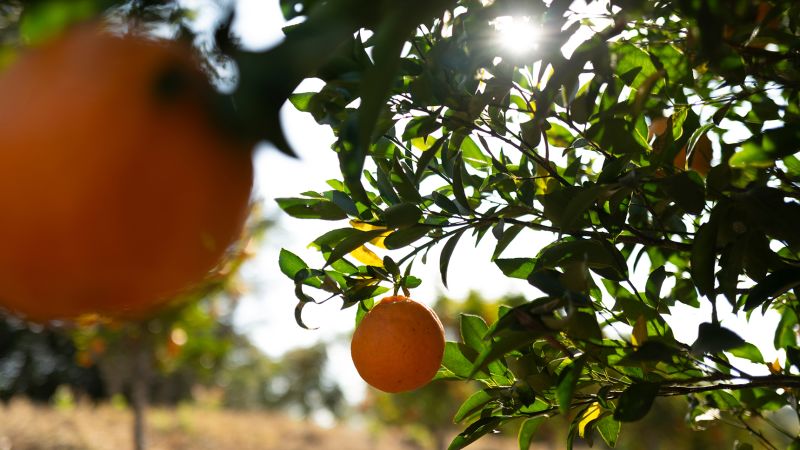In recent developments concerning international trade and tariffs, President Donald Trump’s proposed tariffs on imports from Brazil, specifically targeting orange juice, could potentially add as much as 25% to the retail price of orange juice in American supermarkets such as Aldi, Walmart, and Wegmans. This alarming prediction comes from Johanna Foods, a significant U.S.-based importer and distributor of orange juice, which has officially filed a lawsuit against the Trump administration over the matter, claiming that the tariffs could substantially impact its business operations.
The lawsuit from Johanna Foods stems from a letter President Trump sent to Brazilian President Luiz Inácio Lula da Silva on July 9, which allegedly announced a staggering 50% tariff on goods imported from Brazil. The New Jersey-based company argues that this action was not formalized as a legal executive order and lacks a basis for imposing such a tariff legally. Johanna Foods contends that such tariffs could result in a $70 million loss for their operations, ultimately leading to higher prices for consumers.
In its legal complaint filed in the Court of International Trade in New York, Johanna Foods, along with its subsidiary, Johanna Beverage Company from Spokane, Washington, identifies itself as a critical player in the national orange juice supply chain. The company asserts that it is responsible for supplying nearly 75% of the not-from-concentrate orange juice in the United States. This product is crucial for numerous household brands across the country, including those found in major retailers like Aldi, Walmart, Sam’s Club, Wegmans, Safeway, and Albertsons, as well as their own brand called Tree Ripe, which is primarily offered in stores on the East Coast.
Brazil holds a significant position in the global orange juice market, being the leading producer and responsible for 75% of global exports. The U.S. Department of Agriculture (USDA) indicates that Brazil supplies more than half of all orange juice consumed in the U.S. Therefore, any tariff imposed on Brazilian orange juice could have a ripple effect on production costs and prices. Johanna Foods has estimated that the proposed 50% tariff would increase its annual costs by an extra $68 million, surpassing any profits the company has made in its 30-year history. Importers traditionally absorb the costs of duties and tariffs initially and then transfer these costs to the consumers, which could create a substantial price hike that the company predicts will increase retail prices by 20% to 25%.
The implications of these increased costs are serious. Johanna Foods warns that they would pose significant financial difficulties, potentially jeopardizing jobs for their 685 employees across both New Jersey and Washington. The lawsuit further reveals concerns that these tariffs could cause unacceptable price increases for a breakfast staple, which is a crucial part of American diets.
Furthermore, Johanna Foods emphasizes that the ingredients required for not-from-concentrate orange juice cannot be readily sourced from U.S. suppliers in adequate quality or quantity. The persistence of crop disease in Florida, hurricanes, and the demands of urban development have devastated the local citrus market, impacting the quality and availability of Florida oranges. The USDA foresees that the volume of Florida’s orange crops could reach a 95-year low by 2025.
While the compounding effects of extreme heat and drought in Brazil exacerbate the situation, the prices for essential orange juice products are rising steeply. Notably, a 12-ounce can of frozen orange juice concentrate reached a record high of $4.49 in June, showing a 55% increase from 2022.
Johanna Foods is not alone in its opposition to the tariffs; it is among several small businesses challenging the Trump administration’s trade policies. Although a recent ruling by the U.S. trade court deemed that Trump exceeded his presidential authority regarding nationwide tariffs, a federal appeals court allowed the tariffs to remain in place while the matter continued to be evaluated. Johanna Foods seeks a legal determination that would declare these proposed tariffs unconstitutional, arguing that the tariffs imposed through the International Emergency Economic Powers Act are not valid.
Despite a lack of formal enactment of these tariffs or clear guidelines on their implementation, the Trump administration has defended its position, asserting that such tariffs are a legitimate exercise of executive power intended to protect American workers and national interests. Trump’s correspondence with Brazil tied the tariffs to concerns over the ongoing criminal trial of Brazil’s former president, Jair Bolsonaro, noting the influence of international politics on these trade decisions. Ultimately, these tariffs raise critical questions regarding international trade relations and domestic economic implications for the orange juice supply chain in the United States.










